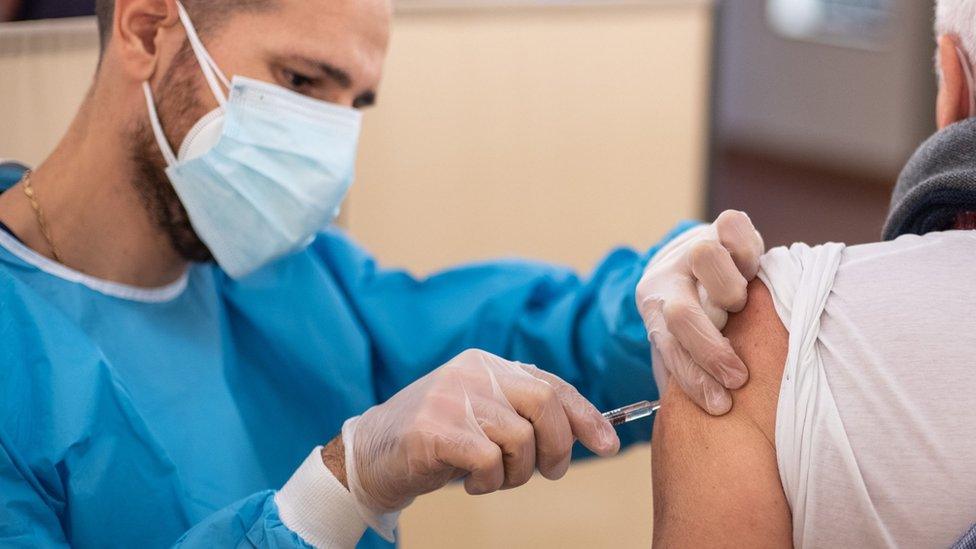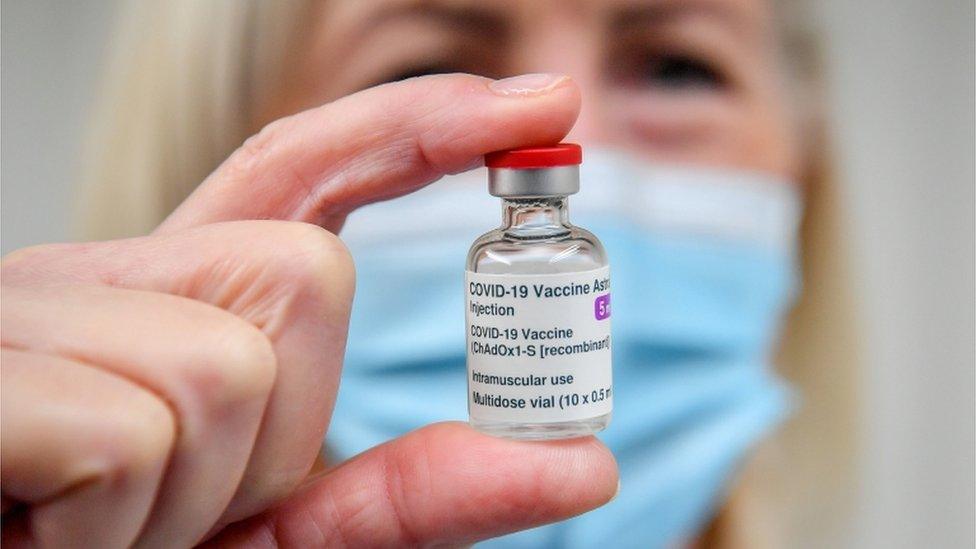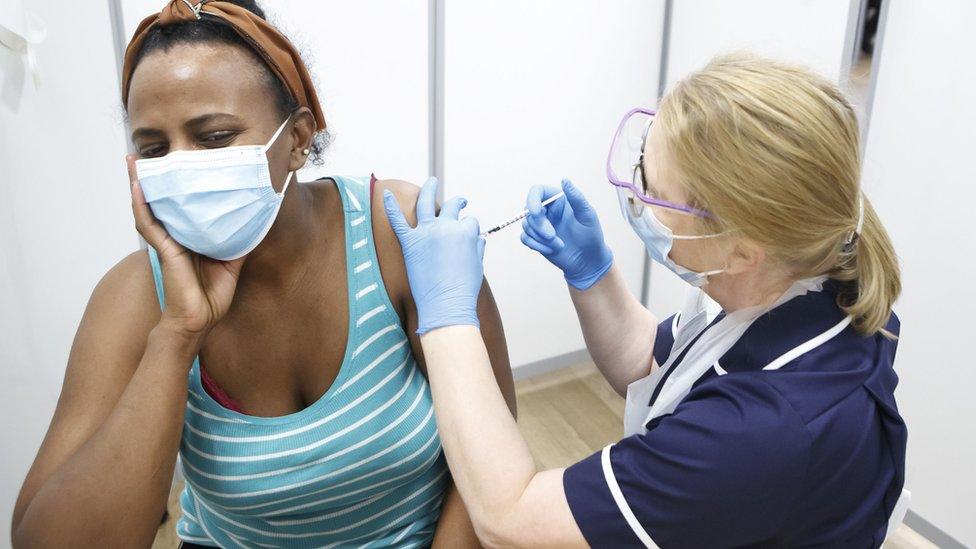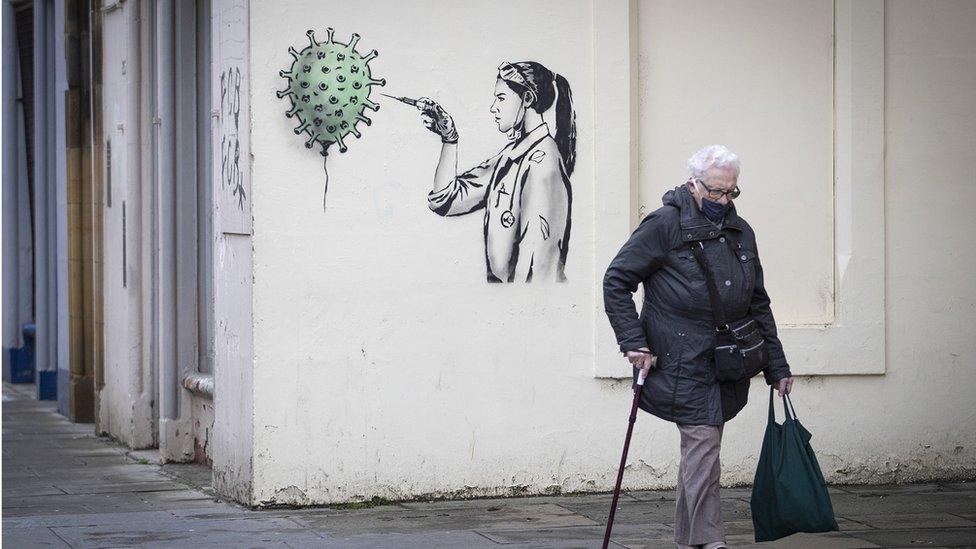Covid in Scotland: Medics concerned over 12-week gap between vaccine doses
- Published
- comments

Doctors in Scotland have raised concerns about plans to delay the second dose of the Pfizer vaccine.
All four UK nations will now leave up to 12 weeks between the first and second doses of the jab rather than giving both within 21 days.
Dr Lewis Morrison, head of the BMA in Scotland, said members had concerns about the potential impact of leaving such a big gap between the two doses.
But the UK's chief medical officers have defended the move.
They said that the first dose of either the Pfizer or the Oxford/AstraZeneca vaccines - the only two so far approved for use in the UK - will give people substantial protection against the virus within two to three weeks of being administered.
And they said that the second dose was "likely to be very important for duration of protection, and at an appropriate dose interval may further increase vaccine efficacy".
The Joint Committee of Vaccination and Immunisation, which advises UK health departments and recommended the new strategy, said data showed that one dose of the Pfizer vaccine would be "90% effective".
But the World Health Organization (WHO) has said it would not recommend following the UK's decision to delay giving the second Pfizer dose, saying there was no evidence to support the decision.
Pfizer has said it has tested the vaccine's efficacy only when the two doses were given up to 21 days apart.
The Pfizer vaccine was the first to be approved for use in the UK, with more than a million people having already been given the first dose.
The change to the vaccination strategy has meant health boards have had to change plans and cancel people booked in for their second doses of the Pfizer jabs.
This includes medics who are among the priority groups for Covid vaccinations.

Dr Lewis Morrison, chairman of the British Medical Association's Scottish Council, raised concerns about the logistical impact of changing the vaccination strategy
Dr Morrison told the BBC's Good Morning Scotland programme that some doctors had told him they would have waited for the AstraZeneca jab, which has been proven to work in the longer timetable, if they had known the second Pfizer dose was going to be delayed.
He said: "We are concerned because there's clearly disagreement about the effectiveness of the second dose of Pfizer after that period of time.
"Furthermore I think if you give more people the first dose when you don't know what vaccine supplies are going to be within that 12-week window, that's a worry that has been expressed to me by a lot of doctors.
"If we give more people the first dose, do we definitely know that the second one is coming?
"The announcement about this before a four-day NHS holiday weekend left many places with great difficulty in reorganising vaccinations, with a real risk that vaccination numbers might perversely drop because of the organisational issues."

Opposition parties want the Scottish government to publish daily figures for how many people have been vaccinated
It comes as NHS staff were left queueing for hours outside Glasgow Royal Infirmary on Tuesday after an "scheduling error" meant vaccination staff did not turn up.
NHS Greater Glasgow and Clyde has apologised to those affected and said it was rearranging the appointments.
The Scottish government has said it aims to have given at least one vaccine dose to everyone over the age of 50 and younger people with underlying health conditions by the start of May.
First Minister Nicola Sturgeon said on Tuesday that the timetable could be accelerated if there were sufficient supplies of the jab.
Daily figures
The Scottish government is being pressured to provide daily figures on the number of people being vaccinated, as the UK government has already pledged to do.
Scottish Conservative leader Douglas Ross said: "There are now no excuses left for the SNP government to dodge publishing daily vaccination rates alongside the daily infection numbers as soon as possible.
"The SNP's evasion to try and avoid scrutiny is nothing new but on something so important, the Scottish public must have the same information as will be provided across the UK."
His call was echoed by Scottish Labour health spokeswoman Monica Lennon, who added: "It is simply unacceptable that scores of NHS staff were left queueing outside in the cold for hours, and well into the evening.
"It's time for Health Secretary Jeane Freeman to get to grips with the vaccination programme, publish daily figures on the number of vaccinations available and administered, and ensure that our NHS staff do not pay the price of a bungled rollout."


- Published31 December 2020

- Published1 January 2021

- Published5 January 2021
